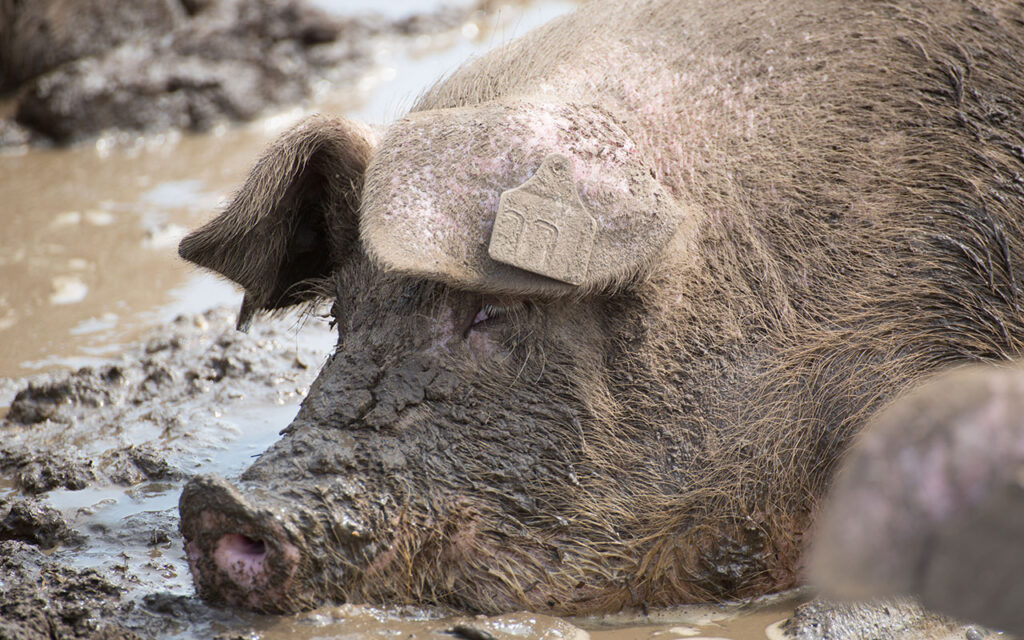The weather has finally turned. We’ve had as much rain in the past week as in the past four months in some parts of the UK – and it has been a challenging year for all branches of agriculture.
Some growing areas have ended up with the best-quality crops ever, while others have fallen way short of average. The knock-on effects on livestock farms have, therefore, been variable.
Aside from the quality of food our pigs end up eating, along with straw quality, this year has highlighted how we need to look after our animals to get the best from them.
Temperature spikes over several heatwaves have created chaos on some farms, while others appear to have coasted through – learnings can be gained to prepare for future, likely more frequent, heat events.
For our sows and gilts, feeling hot while pregnant is never ideal, so providing easily available water for drinking and cooling down is key. Making sure they have a dry area to lie in is integral, but allowing areas of pens to get wetter and muckier helps by allowing wallowing and providing temperature control.
Outdoor paddock provision of wallows and shade can be a challenge, particularly on free-draining land, which obviously helps during the wetter times of the year.
During lactation, sows use huge amounts of energy to produce milk for piglets and this is incredibly energy-intense, a side effect of which is producing heat themselves.
Add the heatwaves to that internal heat generation and we can see why feed intakes during this period can decrease significantly.
Remember that the follicles and eggs for the next litter are getting geared up during this time, meaning any interruption to a balanced energy intake can cause longer-term repercussions for fertility and production – it is so important to try to keep these girls within a comfortable temperature zone.
Outdoors, this can be a challenge, although insulated arcs and airflow can help. Indoors can also be a challenge, although modern misting systems that create cooler zones are starting to show that they can pay for themselves by reducing the overall temperature by up to 7˚C.
I find this amazing, considering it is not using anything more fancy than a bit of evaporating water.
The repercussions
What have been the repercussions of this extra uncontrolled heat in the breeding herd? We have seen some windows of significantly poorer fertility – decreased conception and farrowing rates, along with fluctuating total born, some of which is only coming through to farrow now.
Historically, we have used ‘autumn infertility’ as an observation of decreased production at this time of year, closely associated with day length and light exposure.
Many indoor farms have the lighting controlled through timers and more modern LED fixtures, so this light effect is relatively low.
By far the bigger influence, in my opinion, is the higher temperatures experienced by sows and gilts and the knock-on effect on their feed intake and resulting energy balance.
This is experienced by both indoor and outdoor herds and times relatively well with heat spikes around previous lactation and service – take a look at your own data and the local weather station to see the impact at your end.
So, as we head towards increased numbers and lengths of heatwaves in the UK, make sure you review this summer’s production and start thinking of interventions you can make next year to get them in place ahead of time.
It may be starting to feel cooler, but it will be spring before we know it and temperatures will be rising.
ASF awareness
I first brought up the increased threat of African swine fever to our pig herd back in 2018, when we had the first wave of cases in China, the start of a runaway explosion globally.
We finally seem to have some awareness from the UK authorities that we are totally unprotected from the global movement of the virus through meat products, and that we need to gear up our defences urgently.
Words are simple, however, so let’s hope they join up with the good work already under way in the sector to help prepare ourselves to keep it out, or deal with the consequences if it arrives.




